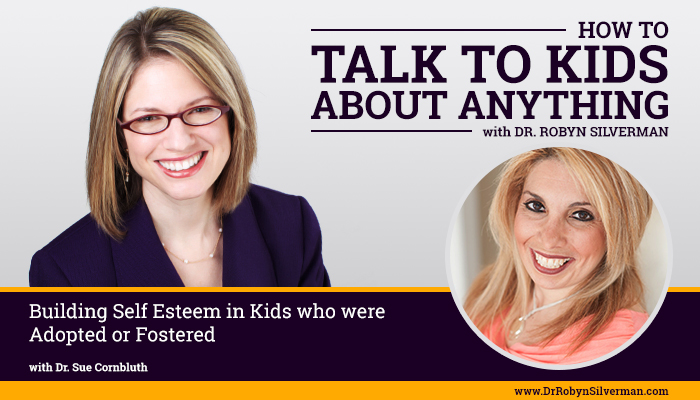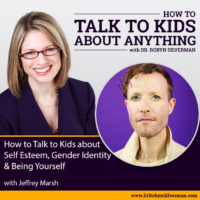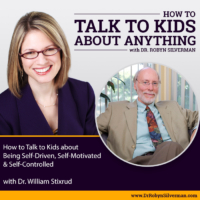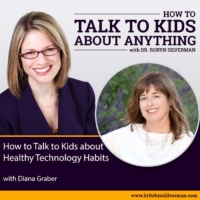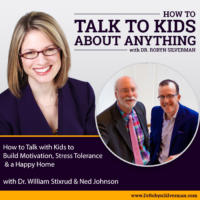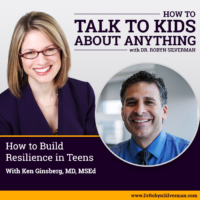Podcast: Play in new window | Download
Subscribe: Apple Podcasts | RSS | More
How to Build Self Esteem in Kids who were Adopted or Fostered
This podcast provides tips, scripts, stories and steps to help parents and educators understand the unique challenges of children who feel different, cast aside or devalued because of experiences in their childhood. Sue Cornbluth talks about children who were in the foster care system or who were adopted and how many of these children can have challenged self esteem due to unanswered questions about their identity or internalized frustrations about their life circumstances. How can we help kids who are being fostered or who have been adopted (perhaps later in life), cultivate the high self esteem and self worth they deserve?
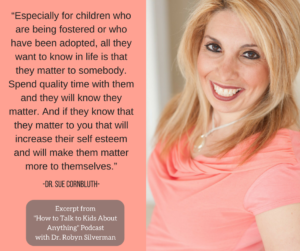 Special Guest: Dr. Sue Cornbluth
Special Guest: Dr. Sue Cornbluth
Dr. Sue Cornbluth is an Internationally Recognized Parenting Expert In High Conflict Divorce and Child Abuse. She is also an Author, TV Contributor and host of “The Dr. Sue Radio Show: Talking About Real Parenting Issues In A Real Way,” on www.streamcityradio.com. She is a regular mental health contributor for an array of networks and television shows such as NBC, FOX, and CBS. Dr. Sue has also contributed to several national publications. Her best-selling book, “Building Self-Esteem in Children and Teens who are Adopted or Fostered” is available now on Amazon.com
The podcast provides:
- Tips: How to help a child who is going through trauma or a difficult time
- Tips: How to help a child who has been fostered or has been adopted increase self esteem.
- Reality Checks: Just because these bad things have happened in your lives, doesn’t mean you don’t have the same opportunities that others can have in their life.
- Scripts: How to talk about self esteem- and questions to ask a child to get at who s/he is and who s/he wants to be. What does s/he like about him or herself?
- The Triple Empowerment System- Educate, Embrace and Empower.
Important Messages:
- Kids in the foster system/who were adopted don’t want to be called “foster kids”- they are just kids who are in a particular life circumstance and want to be seen for more than their life situation.
- Corrective Emotional Experience. We all want to have the best upbringing and have the best parents who can be our role models—but this is not always the case! You can be the kind of person who teaches kids in need that they matter- acknowledge them- encourage them- even if you are not the parent, you can provide this. From this, the children can grow and reach their potential. This can be a corrective emotional experience.
- For kids who were adopted or who are being fostered, one day they are going to grow up and have questions about where they came from, who their birth parents are. A lot of times, in our society, there are stereotypes or labels put on people. This can lower a child’s self esteem.
- Don’t pass judgment about a child’s birth parents- you don’t want a child to feel abandoned.
- Ask your child; “what are you remembering?” What you know is what they are sharing with you. What happened to them is NOT what they are defining them.
- When you are in a closed adoption, you tend to only know a few things. But you can research with your child, the country or state where they came from. If they want to know about their birth parents, help them research the information together. Be a guide and support them. And if they aren’t interested in finding of birth parents, look into their history together or in their birth country together.
- Children are watching you to see how to behave in a conflictual situation. If you are yelling, they will repeat that. If you are calm and collected, they will trust in the process and do as you do.
- When a child messes up, it’s a time for a teachable moment—not always punishment. When you punish a child, they will often come back and do it again. When you use it as a teachable moment, they learn how to do it differently. The parent becomes the corrective teacher.
- Do the people who are judging you poorly- do they know you- do they know your gifts? Teach your children perspective. Are they giving weight to the wrong people’s opinions? Why do these people, who don’t know the truth about you, get to define you?
- Educate yourself about the adoption experience or the foster experience- and don’t be delusional about what is going to happen- stay grounded in reality so you can embrace the children where they are.
Notable Quotables:
- “Experiences are things that happen to you in your life but they don’t need to define every single aspect of who you are.”
- “You can go from being a victim to being a survivor.”
- “Some kids just want to be become more than they were told they were going to be.”
- “We all want to have the best upbringing by our parents and we want them to be or best role models but the truth is, they are not always our best role models in many situations. That doesn’t mean you can’t get what you need from somebody else in your life.”
- “We live in a world where everybody talks about nuclear families ad biological children. It’s just out there in the media and in society. When you find out you’re different, that’s like somebody digging a hole in you and that’s where the low self esteem comes in and you start questioning yourself.”
- “When you have high self esteem and you feel good about yourself, that is your shield! It’s the shield against the world and against what is going to come towards you at times. It helps you build resiliency.”
- “Whenever your kids have questions, you tell the truth. And if you don’t know the truth, you don’t make up a lie. You say; ‘I don’t know right now. I will try to get the information for you’ because what is most important here is that they can trust you and that they don’t feel abandoned.”
- “Children in foster care or who have been abused are looking for someone to join with them in their pain. They want someone to acknowledge it.”
- “You can’t put trauma in the back of your mind. It keeps popping up. Children who have been through trauma need to know that they will be accepted no matter what.”
- “All of you are in this child but we can never forget he or she has two identities and need to merge together in order for that child to feel whole.”
- “You must let your child know that they matter and that they are special in some way.”
- “Especially for children who are being fostered or who have been adopted, all they want to know in life is that they matter to somebody because they often feel that they don’t matter to their birth parents. You can change this. Spend quality time with them and they will know they matter. And if they know that they matter to you that will increase their self esteem and will make them matter more to themselves.”
- “Find something in a child that s/he is good at and invest your time and energy in that area.”
- “When somebody believes in you, you begun to believe more in yourself.”
- Many kids who are being fostered or were adopted come from families in which the birth parents did not value themselves enough to get the help they needed to be a better parent to their child. In that respect, the child needs to know that they are valued even when they mess up.”
- “I want every kid to get to know themselves and define themselves on their own terms.”
- “You can never help others build high self esteem if you don’t have it yourself.”
Resources:
- The Dr. Sue Radio Show: http://www.streamcity.org/dr-sue-show
- Dr. Sue Cornbluth’s Website: https://www.drsueandyou.com/
- Building Self Esteem in Children who are Adopted or Fostered https://www.amazon.com/Building-Self-Esteem-Children-Adopted-Fostered/dp/1849054665

